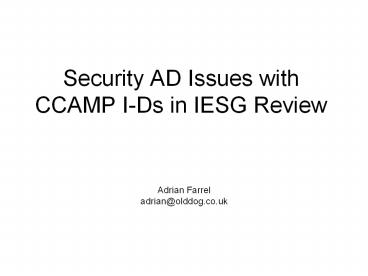Security AD Issues with CCAMP I-Ds in IESG Review - PowerPoint PPT Presentation
Title:
Security AD Issues with CCAMP I-Ds in IESG Review
Description:
Includes review of the Security Considerations section. I-D is reviewed by ... the RecoveryPath message cause the restarting node to behave differently/wrongly? ... – PowerPoint PPT presentation
Number of Views:32
Avg rating:3.0/5.0
Title: Security AD Issues with CCAMP I-Ds in IESG Review
1
Security AD Issues with CCAMP I-Ds in IESG Review
Adrian Farreladrian_at_olddog.co.uk
2
Normal Process
- I-D completes WG last call
- Includes review of the Security Considerations
section - I-D is reviewed by a Routing AD
- Full review of the I-D including Security
- IETF last call
- I-D goes to IESG for review
- Security ADs review the work
- May use Security Directorate to help with the
review
3
Security Concerns with CCAMP Work
- Several recent I-Ds have caused concern
- For example, Inter-domain TE Framework (RFC 4726)
- Our answer has been
- To tighten the language in the Security
Considerations section - To refer forwards to Luyuans work
- Two I-Ds are currently blocked with specific
security concerns
4
Graceful Restart - Issues
- draft-ietf-ccamp-rsvp-restart-ext-08
- What would happen if the downstream neighbour of
a restarting node sent a false RecoveryPath
message? - Might be an accident
- AD is worried about malicious or subverted LSRs
- Could the RecoveryPath message cause the
restarting node to behave differently/wrongly? - Data plane?
- Control plane?
5
Graceful Restart - Responses
- Response and discussion in private emails
- Whole thread copied to CCAMP list
- RSVP-TE trust model is peer-to-peer
- Sender of RecoveryPath message is authenticated
- Therefore, risk is of subversion
- Why is this particular risk so important?
- Why doesnt downstream LSR simply misbehave?
- Send Resv with bogus information
- Install broken forwarding path
- Forward bogus Path message
- RecoveryPath is verified against data plane on
restarting node (which includes outgoing
interface) - Specific parameters have been discussed (ERO,
etc.)
6
RSVP-TE Call Issues
- Is the use of the Notify message in end-to-end
communication a new concepts? - Do existing uses of Notify use security
associations? - How are keys established with potentially many
Notify recipients? - Is authentication a necessary part of Call
processing? - Is automated key exchange/distribution needed?
7
RSVP-TE Call - Responses
- Security is applicable to Calls
- No change in processing for Notify messages
- Security association may be formed between Notify
sender and Notify receiver - RSVP-TE security
- IPsec if Notify is tunnelled
- Notify message may be sent hop-by-hop
- No new security associations required
8
Next Steps
- For the Restart work
- AD would like us to describe all parameters on
RecoveryPath - Lots of work to document thoroughly
- Any volunteers?
- For the Call draft
- AD would like us to do an RFC 4107 analysis
- Examines the need for key management
- Helps select the appropriate mechanism
- Might lead to additions to the I-D
- Face-to-face discussions at this IETF
- Try to cover the specific security issues
- Attempt to clarify the security framework
- Look for a way forward































